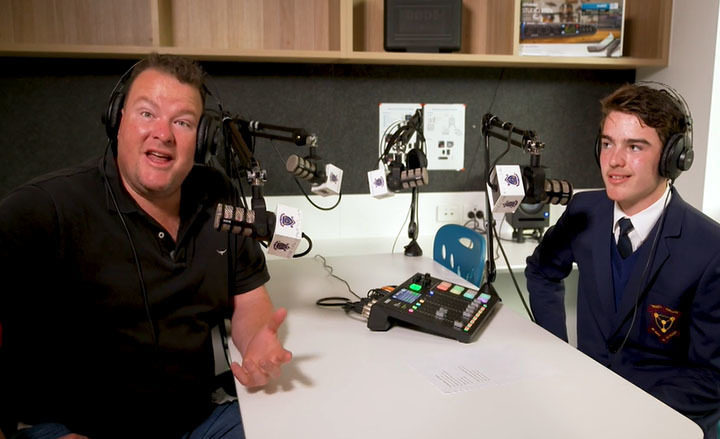December, 2021
2021 SACE Results
Trinity College congratulates all Year 12 students on their fine results for 2022!
- Nathan Stafford is Dux with an ATAR of 99.9
- 30 students attained an ATAR above 90
- The top 4 students attained ATARs above 99 placing them in the top 1% in Australia
- Over 127 Trinity students scored ATARs above 70 in 2021
- 365 ‘A’ Grades were awarded
- 100% of students eligible achieved their SACE
TRINITY COLLEGE 2021 TOP ATARS
- Nathan Stafford - 99.9
- Noah Lunau - 99.4
- Phillip Crosby - 99.05
- Jack Hill - 99.05
- Sophie Brown - 98.95
- Lily Moore - 98.2
- Naomi Lawson - 97.75
- Jake Bonner - 97.4
- Riley Hately - 97.25
- Jade Wood - 96.85
- Eden Smyth - 96.55
- Aballa Opio - 95.7
COLLEGE DUX
In 2021 College Dux is Nathan Stafford with an ATAR of 99.9! Nathan achieved merits in Creative Arts and Research Project B and is looking to pursue the creative arts.
South Aussie with Cosi Visits Trinity
South Australia's only locally produced travel show "South Aussie with Cosi" visited Trinity in November to learn more about what we have to offer students at the College.
Cosi interviewed staff and students and also toured TICS as well as the Equestrian Centre. View the full visit here.

Students Creating Virtual Worlds for Learning
The VR School Study launches a new research partnership with the The Association of Independent Schools of South Australia (AISSA) and 360° VR education company VRTY to explore how student content creation can develop the deeper learning skills of content mastery, collaboration, problem solving, communication, creativity and self-directed learning.
Partnering with nationally and internationally recognised expert Associate Professor Erica Southgate, University of Newcastle, teachers from Trinity College, Pembroke School and SEDA College SA are also co-researchers.
Each school will conduct a bespoke study over time based on the same research questions. This will build a cumulative evidence base on curriculum design and pedagogical choices for powerful learning through 360° VR across STEM-related subjects.
The beauty of the VRTY platform is that students do not need coding skills to create VR environments. This makes it accessible for all students to tell their learning story in VR sophisticated ways and, importantly, share this with others. With the buzz about a metaverse on the horizon, it will be important to empower students to actively engage as content creators of new digital content instead of them being situated as passive consumers. The use of an accessible type of VR for content creation in this project opens up the possibility for all students to have a stake in what is to come.
The VR School Study is unique in its approach to investigating — in all its practical, technical and pedagogical complexity — how VR can be embedded into real school classrooms to value-add to learning, with the project producing useful resources for teachers as well as scholarly insights. Discover more here.


